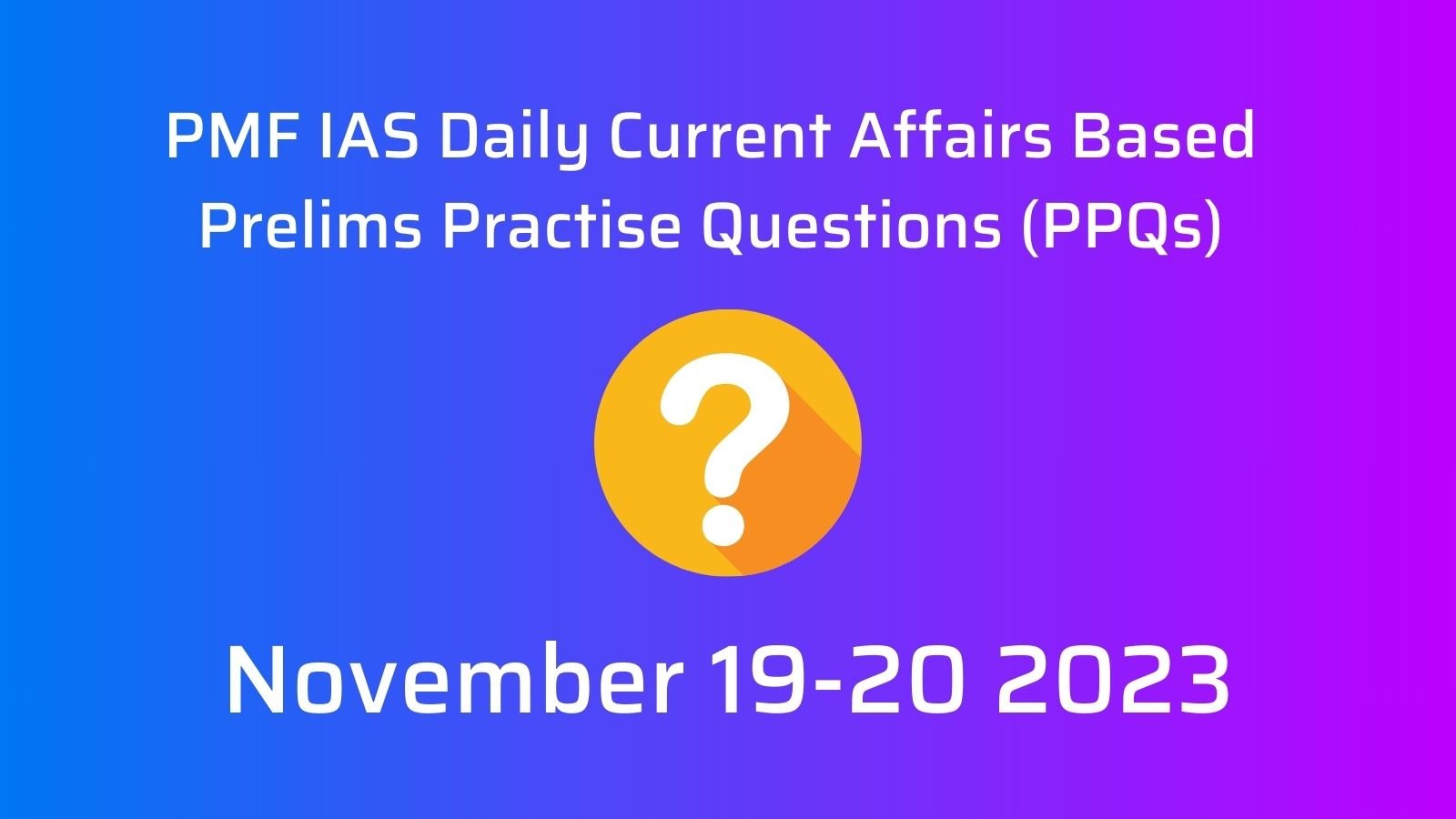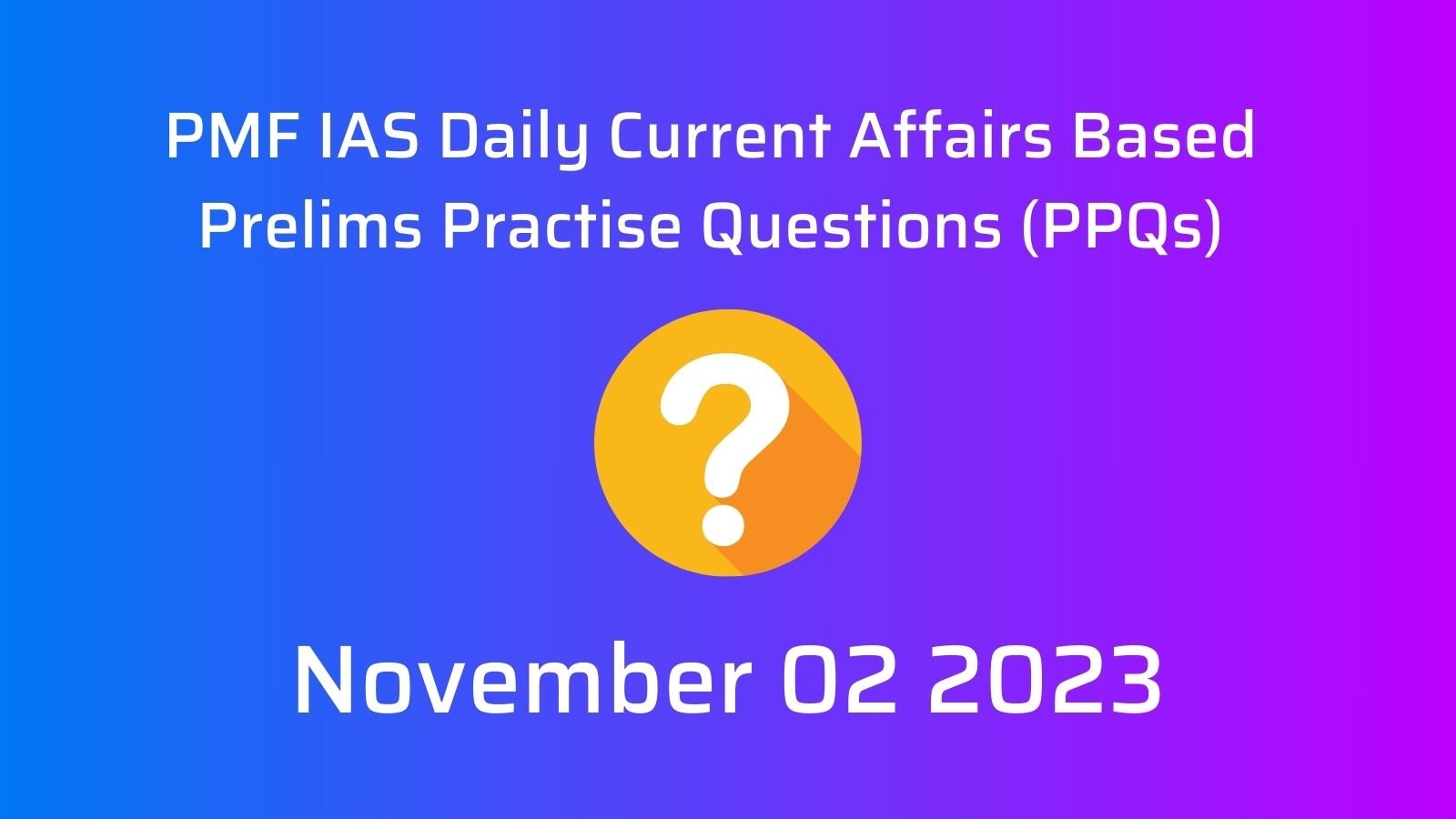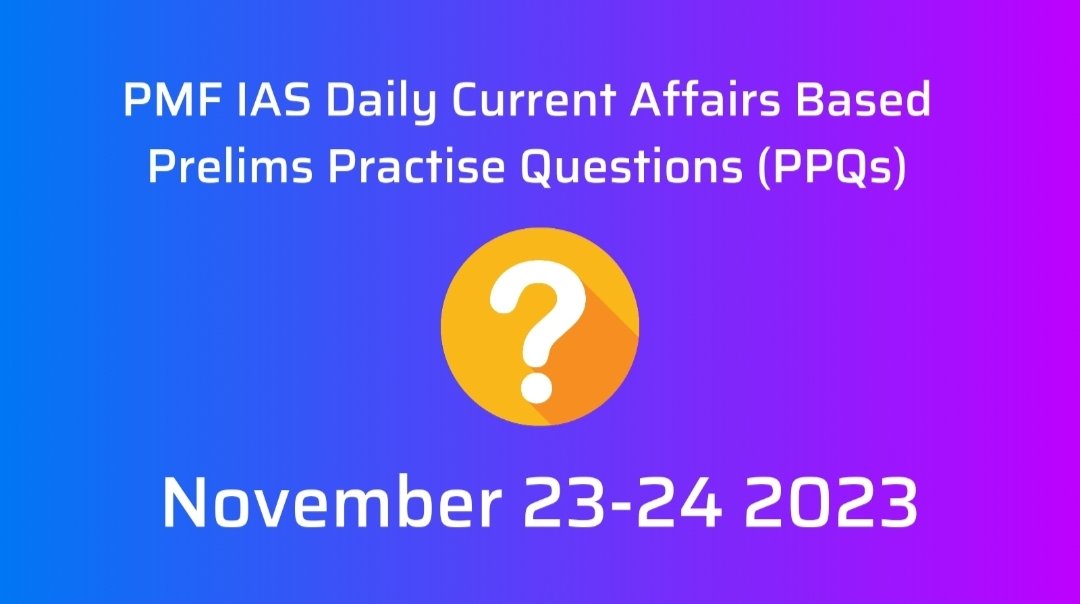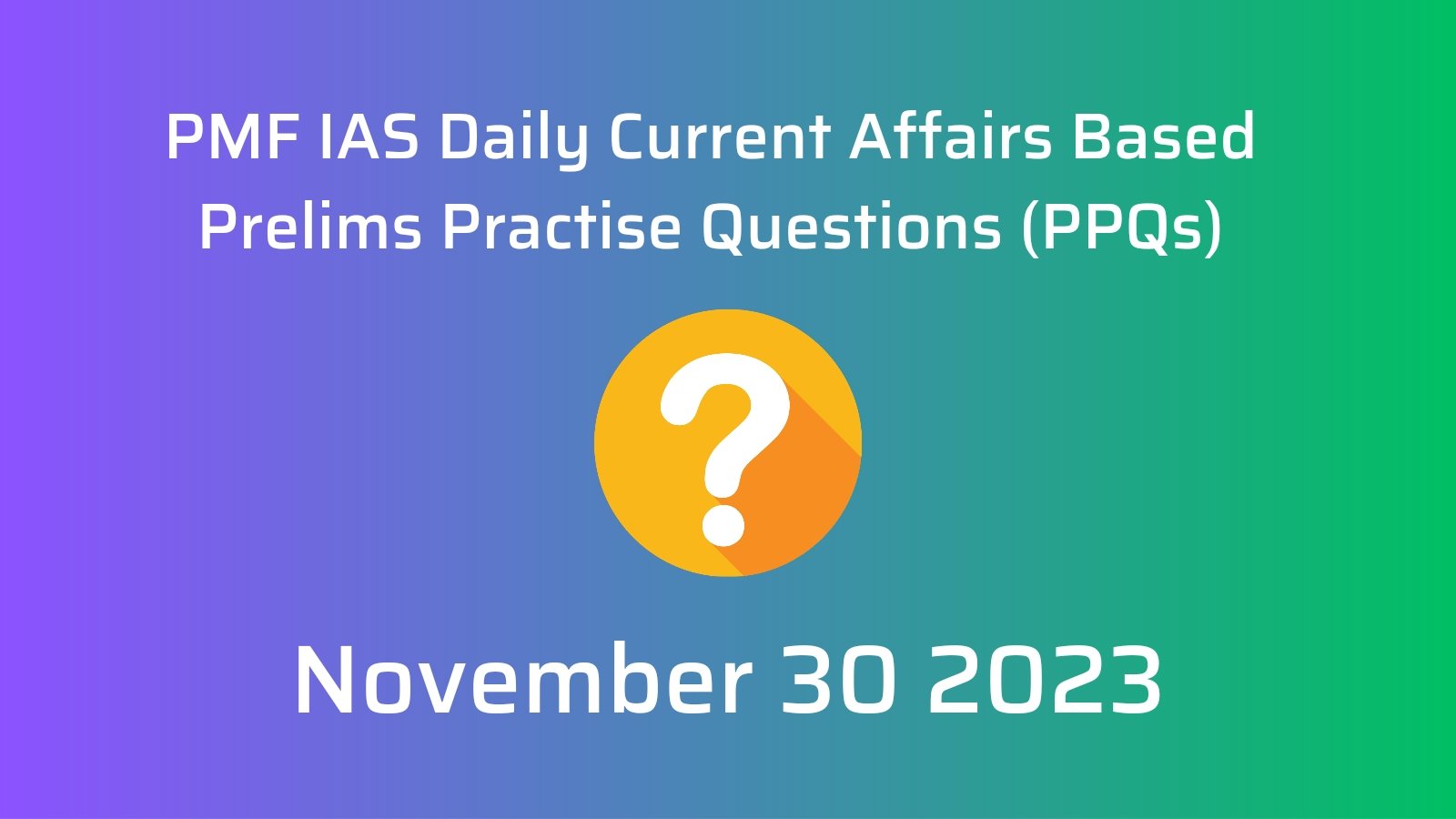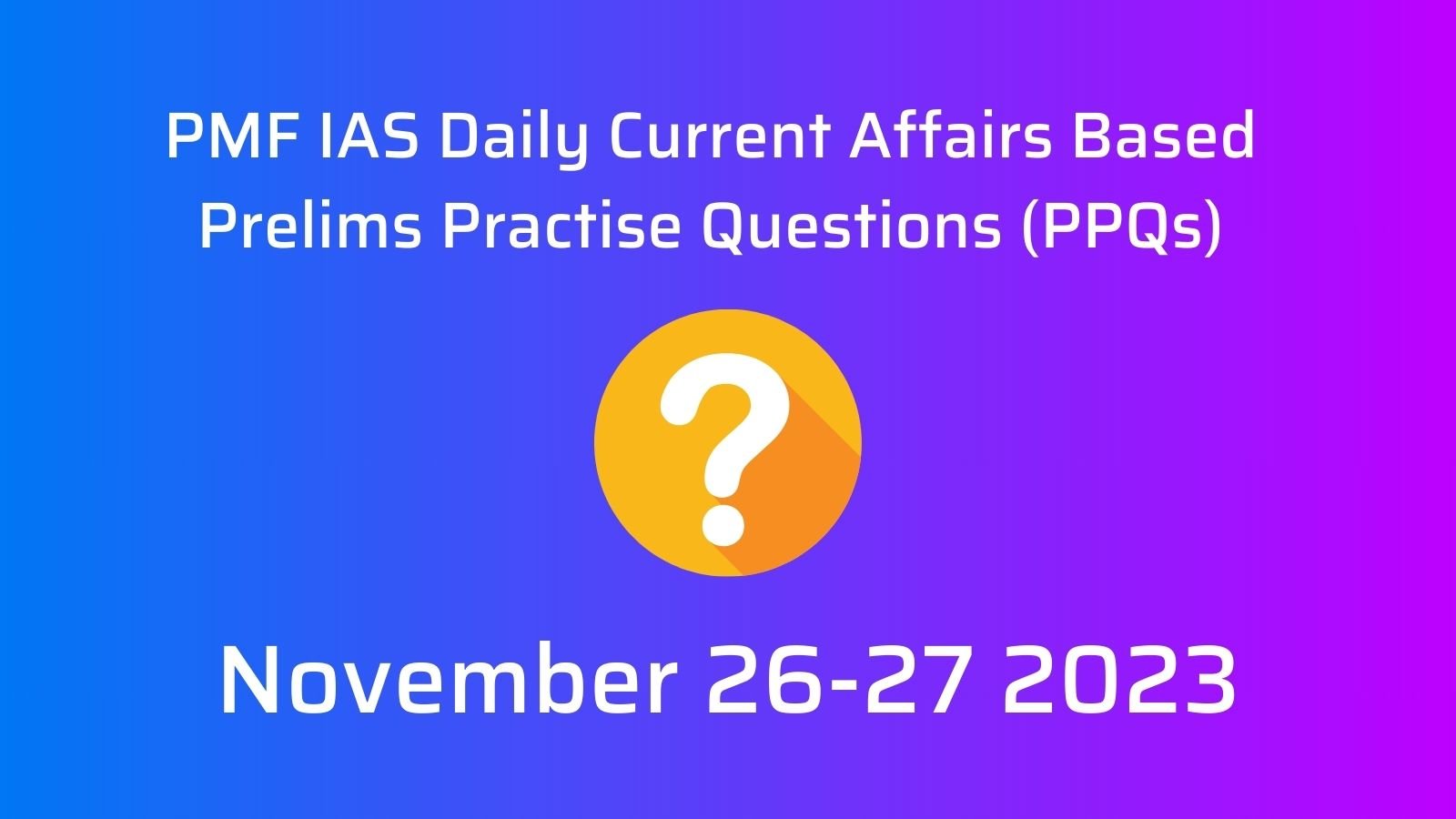
Daily Prelims Practise Questions (PPQs) – November 05-06 2023
Subscribe to Never Miss an Important Update! Assured Discounts on New Products!
Must Join PMF IAS Telegram Channel & PMF IAS History Telegram Channel
Questions
- The questions below are based on PMF IAS Daily Current Affairs – November 2023.
Q1. {Geo – PG – Climatology} Consider the following statements about El Nino:
- It is a climate pattern that causes cooler-than-average sea surface temperatures in the central and eastern Pacific Ocean.
- It causes the Walker circulation to weaken, thus decreasing precipitation in the southern hemisphere.
Which of the above statement(s) is/are correct?
- 1 only
- 2 only
- Both 1 and 2
- Neither 1 nor 2
Q2. {Social Sector – Health – Disease} Consider the following statements regarding Zika virus:
- It is an RNA virus which has a high mutation rate.
- It is transmitted primarily by Aedes mosquitoes, which bite mainly during the daytime.
- The disease spread through blood transfusion and sexual contact only.
- Zika-related infections have never been a Public Health Emergency of International Concern (PHEIC).
Which of the above statement(s) is/are correct?
- 2 and 3 only
- 1 and 2 only
- 1 and 4 only
- 1, 2, 3 and 4
Q3. {IR – India-Bhutan} Consider the following statements:
- India is Bhutan’s largest trading partner, accounting for about 80% of its exports and imports.
- Bhutan has shared borders with only four Indian states.
- Both India and Bhutan are members of SAARC, G20 and BIMSTEC.
How many of the above statement(s) is/are correct?
- Only one
- Only two
- All three
- none
Q4. {IR – India-Maldives} What was the primary objective of “Operation Cactus,” a significant military operation undertaken by the Indian Armed Forces?
- To counter illegal fishing activities in the Indian Ocean and protect India’s maritime interests.
- To rescue hostages from a hijacked Indian Airlines flight in a daring counter-terrorism operation.
- To provide critical humanitarian assistance and disaster relief during a catastrophic natural disaster in the neighbouring countries.
- To conduct a military operation against insurgents based in a neighbouring country and restore regional stability.
Q5. {IS – Initiatives} Consider the following statements about the Chief of Defence Staff (CDS) of India :
- The CDS is the principal military adviser to the Defence Minister of India.
- He acts as the Permanent chairman of the Chiefs of Staff Committee (COSC)
- The CDS is appointed by the Prime Minister of India with concurrence from the National Security Advisor.
- Recently, the CDS has approved India’s first-ever National Security Strategy (NSS).
How many of the above statement(s) is/are correct?
- Only one
- Only two
- Only three
- All four
Q6. {MoEITY – Laws} Regarding the legality of Gambling in India, which of the statements is correct?
- In India, the states have the right to formulate their own gambling laws.
- Amendment to the Information Technology Act of 2011 stated that websites offering online gambling services must be located inside India.
- All the states of India have their own gambling laws.
- The Public Gambling Act of 1867 allows running or being in charge of a public gambling house.
Q7. {Polity – IC – Election} With reference to various types of Voting systems, consider the following statements:
- The Mixed-Member Proportional (MMP) system allows voters to split their votes or give both votes to one party.
- Proportional Representation (PR) systems aim to allocate seats in proportion to the overall share of the vote a political party receives.
- In the First-Past-the-Post (FPPS) system, the candidate with the most votes in a given constituency or electoral district wins.
How many of the above statement(s) is/are correct?
- Only one
- Only two
- All three
- None
Q8. {S&T – AI} Consider the following statements:
- The world’s inaugural Artificial Intelligence Safety Summit was convened in the United Kingdom.
- The summit resulted in the adoption of the Bletchley Park Declaration.
- India abstained from signing the Bletchley Park Declaration, citing concerns about excessive regulations pertaining to frontier AI technologies.
Which of the above statement(s) is/are correct?
- 1 and 2 only
- 2 and 3 only
- 1 and 3 only
- 1, 2 and 3
Questions With Solution and Explanation
Q1. {Geo – PG – Climatology} Consider the following statements about El Nino:
- It is a climate pattern that causes cooler-than-average sea surface temperatures in the central and eastern Pacific Ocean.
- It causes the Walker circulation to weaken, thus decreasing precipitation in the southern hemisphere.
Which of the above statement(s) is/are correct?
- 1 only
- 2 only
- Both 1 and 2
- Neither 1 nor 2
Explanations
Statement 1 is incorrect
- El Nino is a climate pattern that causes warmer-than-average sea surface temperatures in the central and eastern Pacific Oceans.
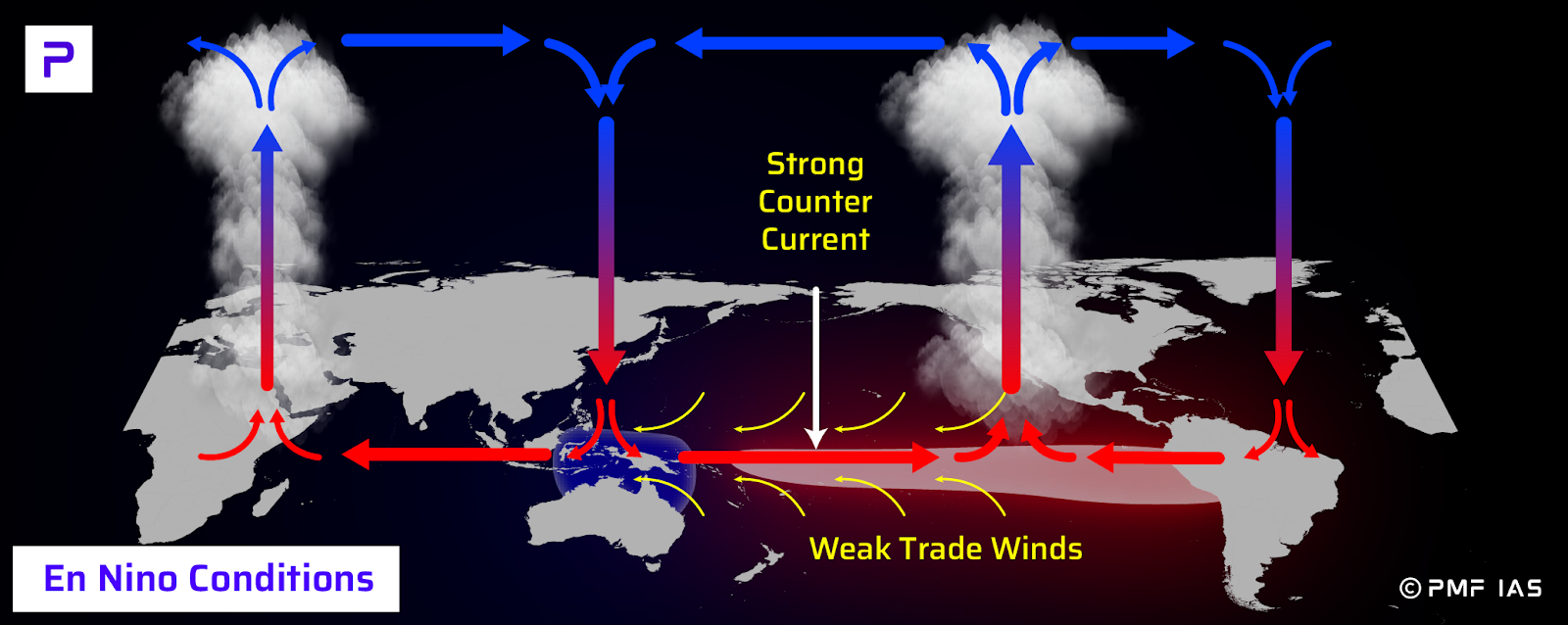
Statement 2 is correct
- One of the impacts of El Nino is a decrease in precipitation in the southern hemisphere.
- This is because it causes the Walker circulation, a major atmospheric circulation pattern, to weaken.
- In normal conditions, the Walker circulation moves warm, moist air from the western Pacific to the eastern Pacific, where it rises and releases precipitation.
- So, when the Walker circulation weakens, less precipitation falls in the southern hemisphere.
Answer: (b) 2 only
Q2. {Social Sector – Health – Disease} Consider the following statements regarding Zika virus:
- It is an RNA virus which has a high mutation rate.
- It is transmitted primarily by Aedes mosquitoes, which bite mainly during the daytime.
- The disease spread through blood transfusion and sexual contact only.
- Zika-related infections have never been a Public Health Emergency of International Concern (PHEIC).
Which of the above statement(s) is/are correct?
- 2 and 3 only
- 1 and 2 only
- 1 and 4 only
- 1, 2, 3 and 4
Explanations
Statement 1 is correct
- Zika Virus is an RNA Virus with a very high mutation rate.
Statement 2 is correct
- Zika virus disease is an infectious disease caused by the Zika virus, a mosquito-borne flavivirus.
- Zika virus is transmitted primarily by Aedes mosquitoes, which bite mainly during the daytime.
Statement 3 is incorrect
- It is a contagious disease that spreads through:
- sexual contact
- transfusion of blood
- pregnancy (from mother to fetus)
Statement 4 is incorrect
- In 2016, WHO declared Zika-related microcephaly a Public Health Emergency of International Concern (PHEIC), which ended in the same year.
Answer: (b) 1 and 2 only
Q3. {IR – India-Bhutan} Consider the following statements:
- India is Bhutan’s largest trading partner, accounting for about 80% of its exports and imports.
- Bhutan has shared borders with only four Indian states.
- Both India and Bhutan are members of SAARC, G20 and BIMSTEC.
How many of the above statement(s) is/are correct?
- Only one
- Only two
- All three
- none
Explanations
Statement 1 is correct
- India-Bhutan: India is Bhutan’s largest trading partner as well as the largest development partner of Bhutan, accounting for about 80% of its exports and imports.
Statement 2 is correct
- Geographical significance: Shares borders with four Indian states: Assam, Arunachal Pradesh, West Bengal, and Sikkim.
Statement 3 is incorrect
- Bhutan is a member of SAARC and BIMSTEC but not a member of G20.
- India is a member of all three groupings.
Answer: (a) Only two
Q4. {IR – India-Maldives} What was the primary objective of “Operation Cactus,” a significant military operation undertaken by the Indian Armed Forces?
- To counter illegal fishing activities in the Indian Ocean and protect India’s maritime interests.
- To rescue hostages from a hijacked Indian Airlines flight in a daring counter-terrorism operation.
- To provide critical humanitarian assistance and disaster relief during a catastrophic natural disaster in the neighbouring countries.
- To conduct a military operation against insurgents based in a neighbouring country and restore regional stability.
Explanations
- “Operation Cactus” was the Indian military operation conducted in 1988 in the Maldives in response to a coup attempt that threatened the government of President Maumoon Abdul Gayoom.
- Within hours of the request by the Maldivian President, the Indian govt, led by PM Rajiv Gandhi, decided to intervene.
- The Indian Armed Forces, primarily the Indian Army and Air Force, launched a quick and effective intervention. This operation was codenamed ‘Operation Cactus’.
- Indian paratroopers were airlifted from Agra and landed at Hulhule airport near the Maldivian capital of Malé. It was instrumental in regaining control and thwarting the coup attempt.
- The Indian Navy also played a crucial role, with naval vessels deployed to cut off escape routes for the mercenaries.
Answer: (a) To conduct a military operation against insurgents based in a neighbouring country and restore regional stability.
Q5. {IS – Initiatives} Consider the following statements about the Chief of Defence Staff (CDS) of India :
- The CDS is the principal military adviser to the Defence Minister of India.
- He acts as the Permanent chairman of the Chiefs of Staff Committee (COSC)
- The CDS is appointed by the Prime Minister of India with concurrence from the National Security Advisor.
- Recently, the CDS has approved India’s first-ever National Security Strategy (NSS).
How many of the above statement(s) is/are correct?
- Only one
- Only two
- Only three
- All four
Explanations
Statements 1 and 2 are correct
- In 2019, the GoI approved the creation of the post of CDS, who would also function as:
- The principal military adviser to the Defence Minister
- Secretary of the Department of Military Affairs (DMA)
- Permanent chairman of the Chiefs of Staff Committee (COSC)
- After the appointment of the CDS, the armed forces were brought under the ambit of the DMA.
Statement 3 is incorrect
- The Chief of Defence Staff (CDS) in India is appointed by the President of India.
Statement 4 is incorrect
- Since its independence in 1947, India has not defined a National Security Strategy (NSS).
- In 2007, a draft NSS was prepared by the Integrated Defence Staff but wasn’t approved by the Cabinet Committee of Security.
- In 2018, the GoI established the Defence Planning Committee, whose mandate includes drafting a National Security Strategy for India.
- In 2021, Chief of Defence Staff (CDS) General Bipin Rawat emphasized the need to define the NSS.
- India is working on its first-ever National Security Strategy (NSS).
- National Security Strategy (NSS) is a comprehensive document outlining national security objectives and the means to achieve them.
Answer: (b) Only two
Q6. {MoEITY – Laws} Regarding the legality of Gambling in India, which of the statements is correct?
- In India, the states have the right to formulate their own gambling laws.
- Amendment to the Information Technology Act of 2011 stated that websites offering online gambling services must be located inside India.
- All the states of India have their own gambling laws.
- The Public Gambling Act of 1867 allows running or being in charge of a public gambling house.
Explanations
- In India, Gambling is under the State List. Thus, states have the right to formulate their own gambling laws. Some states, like Goa and Sikkim, have legalized casinos.
- Amendment in the Information Technology Act of 2011 stated that websites offering online gambling services must be located outside India.
- The Public Gambling Act of 1867 prohibits running or being in charge of a public gambling house.
- Only some states like Goa, Sikkim, etc., have Gambling laws.
Answer: (a) In India, states have the right to formulate their own gambling laws.
Q7. {Polity – IC – Election} With reference to various types of Voting systems, consider the following statements:
- The Mixed-Member Proportional (MMP) system allows voters to split their votes or give both votes to one party.
- Proportional Representation (PR) systems aim to allocate seats in proportion to the overall share of the vote a political party receives.
- In the First-Past-the-Post (FPPS) system, the candidate with the most votes in a given constituency or electoral district wins.
How many of the above statement(s) is/are correct?
- Only one
- Only two
- All three
- None
Explanations
Statement 1 is correct
- The Mixed-Member Proportional (MMP) system allows voters to split their votes or give both votes to one party (double tick). New Zealand follows the MMP system.
- Under MMP, voters have two votes:
- A party vote: To determine the overall parliamentary composition.
- An electorate vote: To select a local MP.
- It allows voters to choose a candidate from a different party if they don’t like the local candidate from their preferred party.
- In parliament, winning candidates become MPs, and the remaining seats are filled from party lists.
Statement 2 is correct
- The Proportional Representation (PR) system aims to allocate seats in proportion to the overall share of the vote a political party receives.
- There are various types of PR systems, including list PR, single transferable vote (STV) etc.
Statement 3 is correct
- First-Past-the-Post (FPPS): In this system, the candidate with the most votes in a given constituency or electoral district wins.
- It is a simple winner-takes-all system where candidates do not need to receive an absolute majority of the votes to win.
- India follows the FPPS system.
Answer: (c) All three
Q8. {S&T – AI} Consider the following statements:
- The world’s inaugural Artificial Intelligence Safety Summit was convened in the United Kingdom.
- The summit resulted in the adoption of the Bletchley Park Declaration.
- India abstained from signing the Bletchley Park Declaration, citing concerns about excessive regulations pertaining to frontier AI technologies.
Which of the above statement(s) is/are correct?
- 1 and 2 only
- 2 and 3 only
- 1 and 3 only
- 1, 2 and 3
Explanations
Statement 1 is correct
- The world’s first Artificial Intelligence (AI) Safety Summit was held at Bletchley Park in the UK.
Statement 2 is correct
- At the summit, the Bletchley Park Declaration was signed to minimise risks from ‘frontier AI’.
- Frontier AI is defined as highly capable foundation generative AI models that could possess dangerous capabilities that can pose severe risks to public safety.
- Generative can produce various types of content, including text, imagery, audio and synthetic data.
- Foundation models are trained on a broad set of unlabeled data that can be used for different tasks with minimal fine-tuning.
- Foundation models will replace the task-specific models that now dominate the AI landscape.
Statement 3 is incorrect
- 28 countries that have signed the declaration include the US, China, Japan, the UK, France, India, and the European Union.
- The declaration was also endorsed by Brazil, Ireland, Kenya, Saudi Arabia, Nigeria, and the UAE.




![PMF IAS Environment for UPSC 2022-23 [paperback] PMF IAS [Nov 30, 2021]…](https://pmfias.b-cdn.net/wp-content/uploads/2024/04/pmfiasenvironmentforupsc2022-23paperbackpmfiasnov302021.jpg)
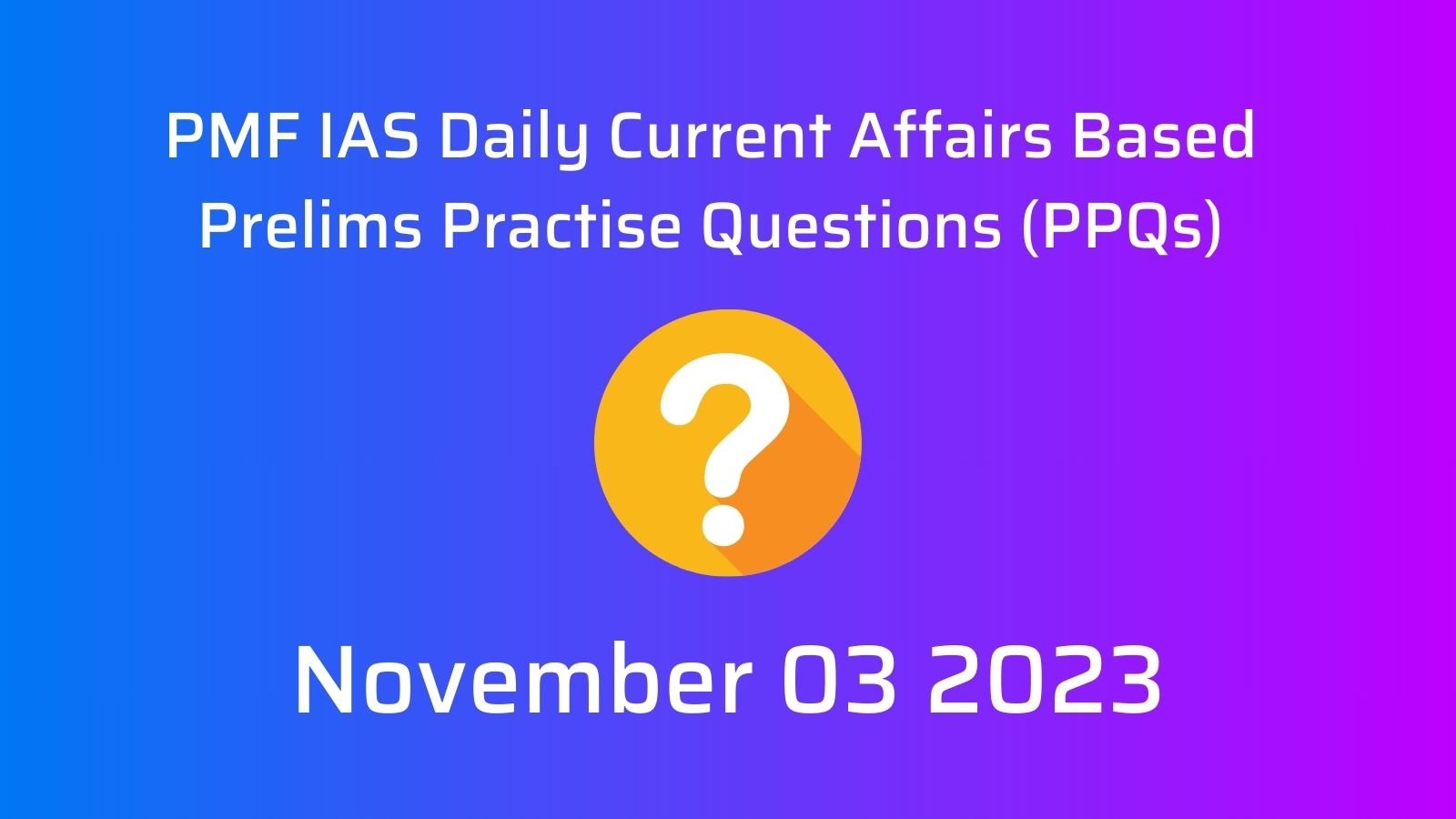
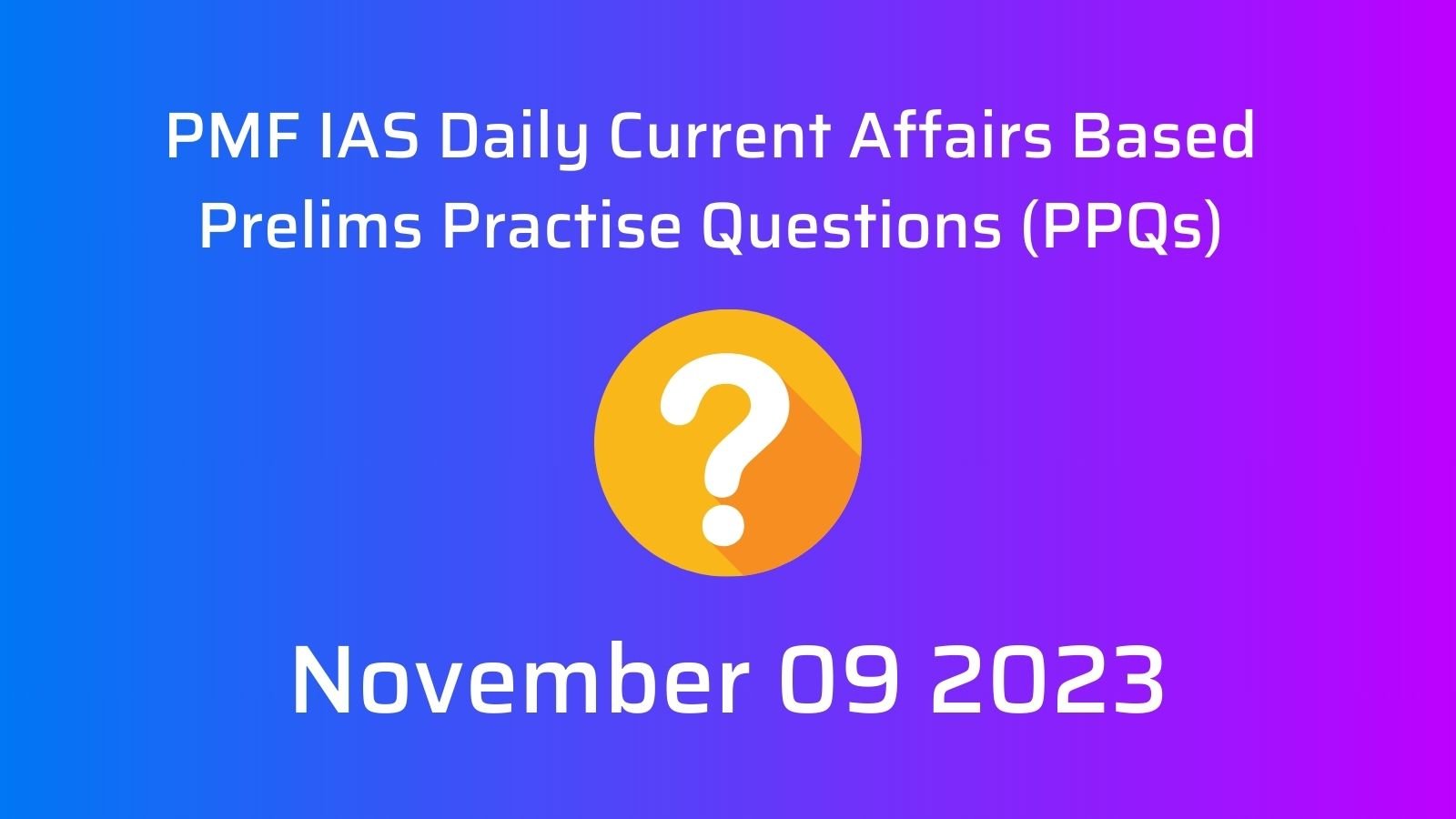
![IMG WA[]](https://pmfias.b-cdn.net/wp-content/uploads/2023/11/IMG-20231121-WA00241.jpg)
